‘We are at war’: Netanyahu vows revenge after Palestinians launch biggest attack on Israel in decades
Israeli army officials tell The Independent that Saturday marked ‘the worst day for Israeli civilians ever’
Your support helps us to tell the story
From reproductive rights to climate change to Big Tech, The Independent is on the ground when the story is developing. Whether it's investigating the financials of Elon Musk's pro-Trump PAC or producing our latest documentary, 'The A Word', which shines a light on the American women fighting for reproductive rights, we know how important it is to parse out the facts from the messaging.
At such a critical moment in US history, we need reporters on the ground. Your donation allows us to keep sending journalists to speak to both sides of the story.
The Independent is trusted by Americans across the entire political spectrum. And unlike many other quality news outlets, we choose not to lock Americans out of our reporting and analysis with paywalls. We believe quality journalism should be available to everyone, paid for by those who can afford it.
Your support makes all the difference.Israel has declared itself at war and vowed “immense” revenge after Hamas launched an unprecedented strike across the heavily fortified border with Gaza, firing thousands of rockets in a shock attack by land, sea and air.
Nearly 50 years to the day since the brutal Yom Kippur or October war, the Palestinian militant group caught Israel by surprise with the largest military threat it has faced in the intervening half century.
Dozens of Israelis were taken hostage from an Israeli settlement near the border with Gaza, with footage of being people being manhandled posted on social media.
Israel responded almost immediately to the early morning assault by launching its own attacks inside Gaza and calling up its military reservists as warning sirens sounded across southern and central parts of the country. At least 232 Gazans were killed in retaliatory strikes.
Israeli army officials told The Independent that Saturday marked “the worst day for Israeli civilians ever”, with at least 250 Israelis believed to have been killed and more than 1,500 injured.
“This is a number we have never seen before,” said Major Nir Dinar of the Israeli army, adding that the capture and hostage taking of Israelis was “unbearable” and “terrible”.
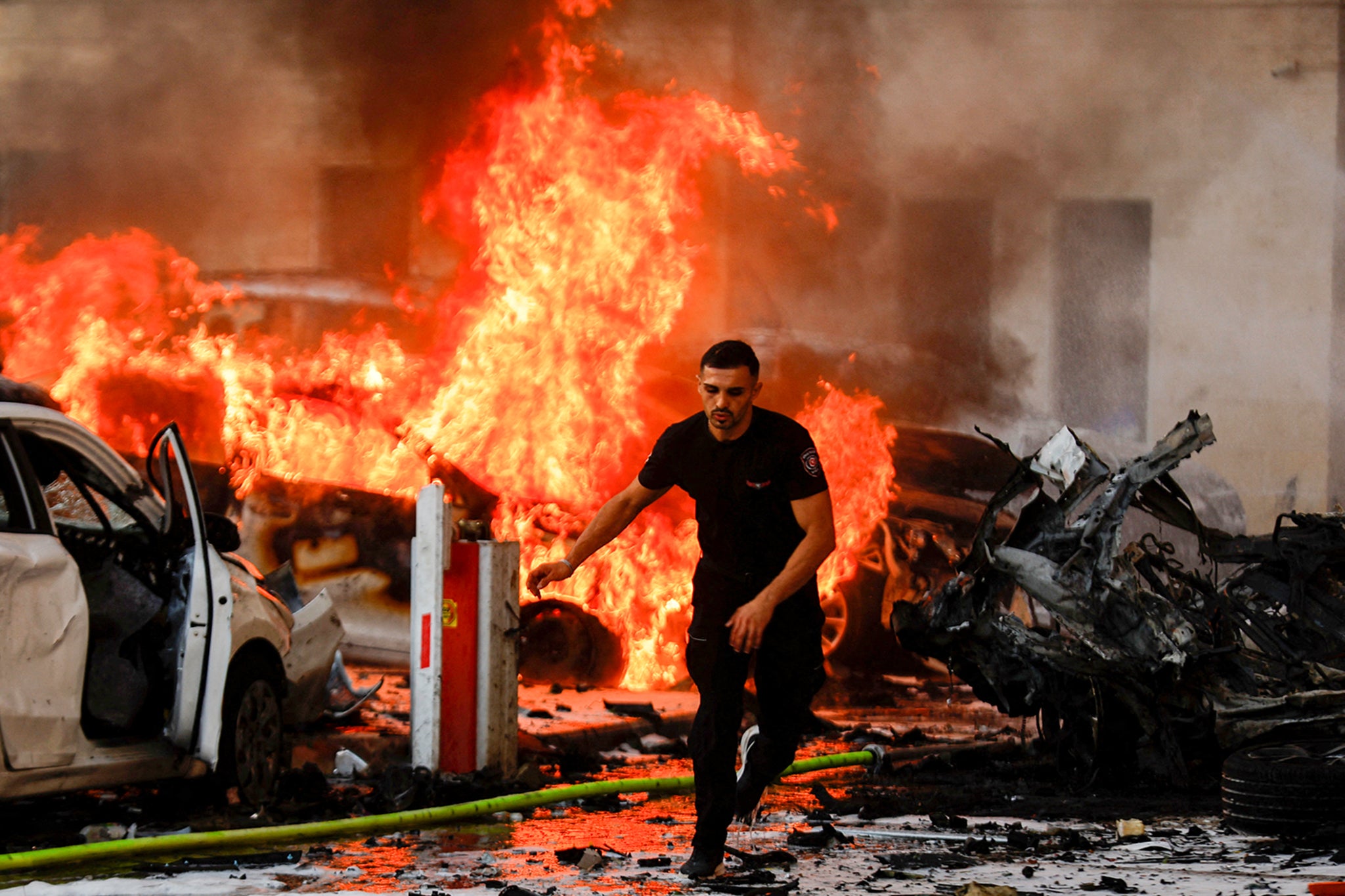
“We have never seen communities around the Gaza envelope infiltrated, not this way before. Hamas just decided to go to war, it will pay a huge price.”
Maj Dinar said Hamas invaded Israel in three ways – from air, ground and sea. It managed to destroy parts of the border fence with explosives and then it drove motorcycles and cars into military bases and communities. “To be frank, to get into a military base or community it is not that hard. What was supposed to be difficult was breaching the fence,” Maj Dinar said. “We have invested millions of dollars in a strong fence and an underground wall that prevented the tunnel building but they found a way out.”
The attack took place on the Jewish holiday of Simchat Torah, with Israelis waking up to sirens sounding across southern and central parts of the country, including Tel Aviv and Jerusalem.
Hamas, a designated terrorist group in the UK, had stormed the border and attacked nearby settlements, with some even paragliding into Israel from Gaza.
Grim footage from southern Israel showed the twisted metal of burnt-out buildings as people ran for their lives. Bodies of civilians were photographed lying in the streets of the Israeli border town of Sderot which had been overrun by militants.
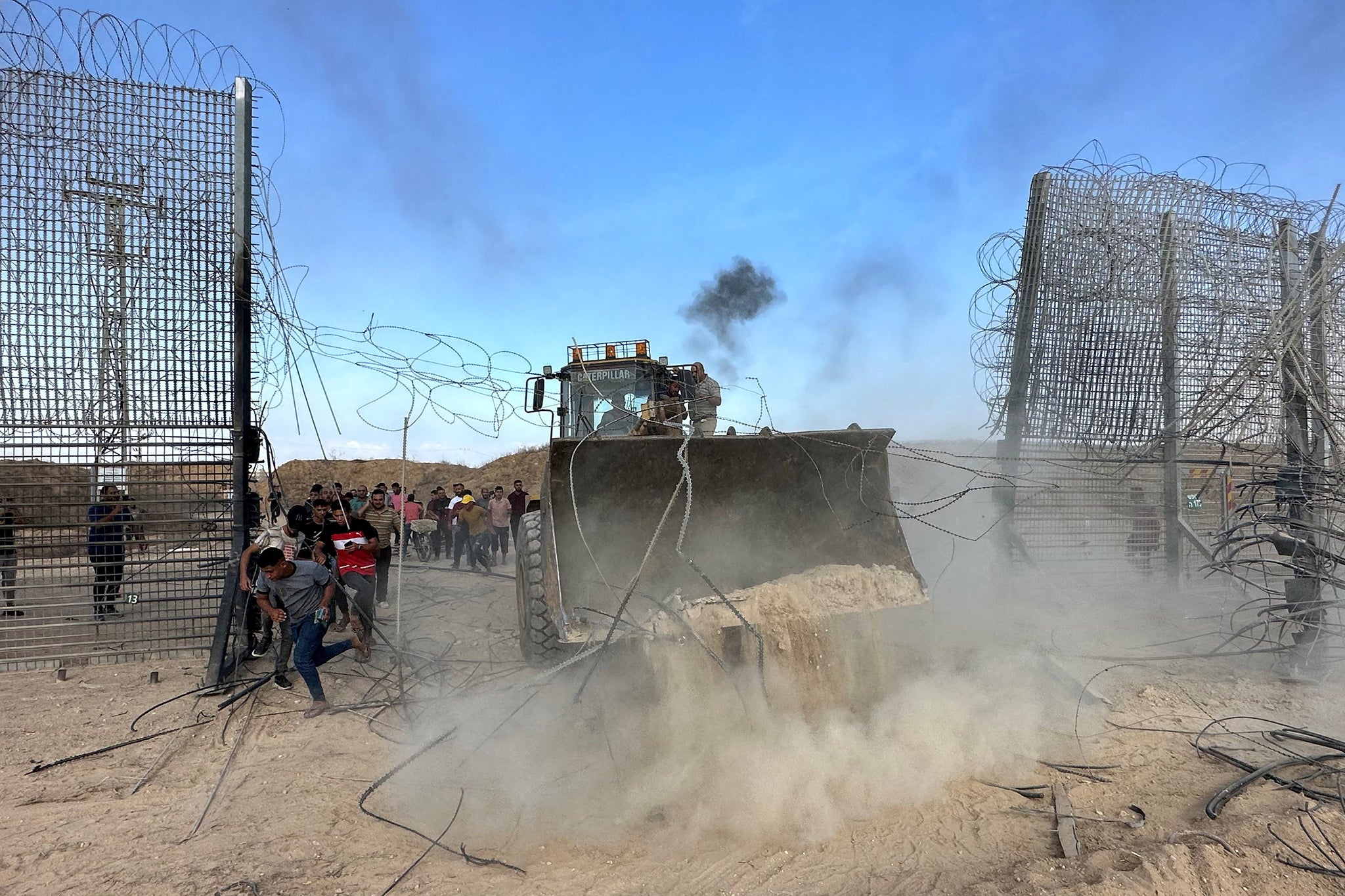
The Independent spoke to Israelis via text who were in the southern cities under attack. One man said they had to “be quiet” as they were hiding in their houses.
Hamas deputy chief Saleh al-Arouri also claimed to Al Jazeera that the group had taken enough captives to force Israel to free all Palestinian prisoners.
The hostages are being held at Kibbutz Bari, an Israeli settlement near the border with Gaza, the Israeli military confirmed to The Independent.
Images on social media appeared to show gunmen taking an elderly Israeli woman into Gaza on a golf cart, and a dead Israeli soldier being trampled by a crowd of Palestinians.
Maj Dinar said soldiers – both dead and alive – were being taken to Gaza: “Hamas is uploading pictures of their military IDs. This is how parents are learning of their children being kidnapped to Gaza: from social media. We are still fighting. It’s a kind of chaos.”
Hamas said it had launched an “all-out battle” of “honour, resistance and dignity” to defend Al-Aqsa mosque in Jerusalem, following a series of attacks and raids on Palestinian worshippers at the holy site.
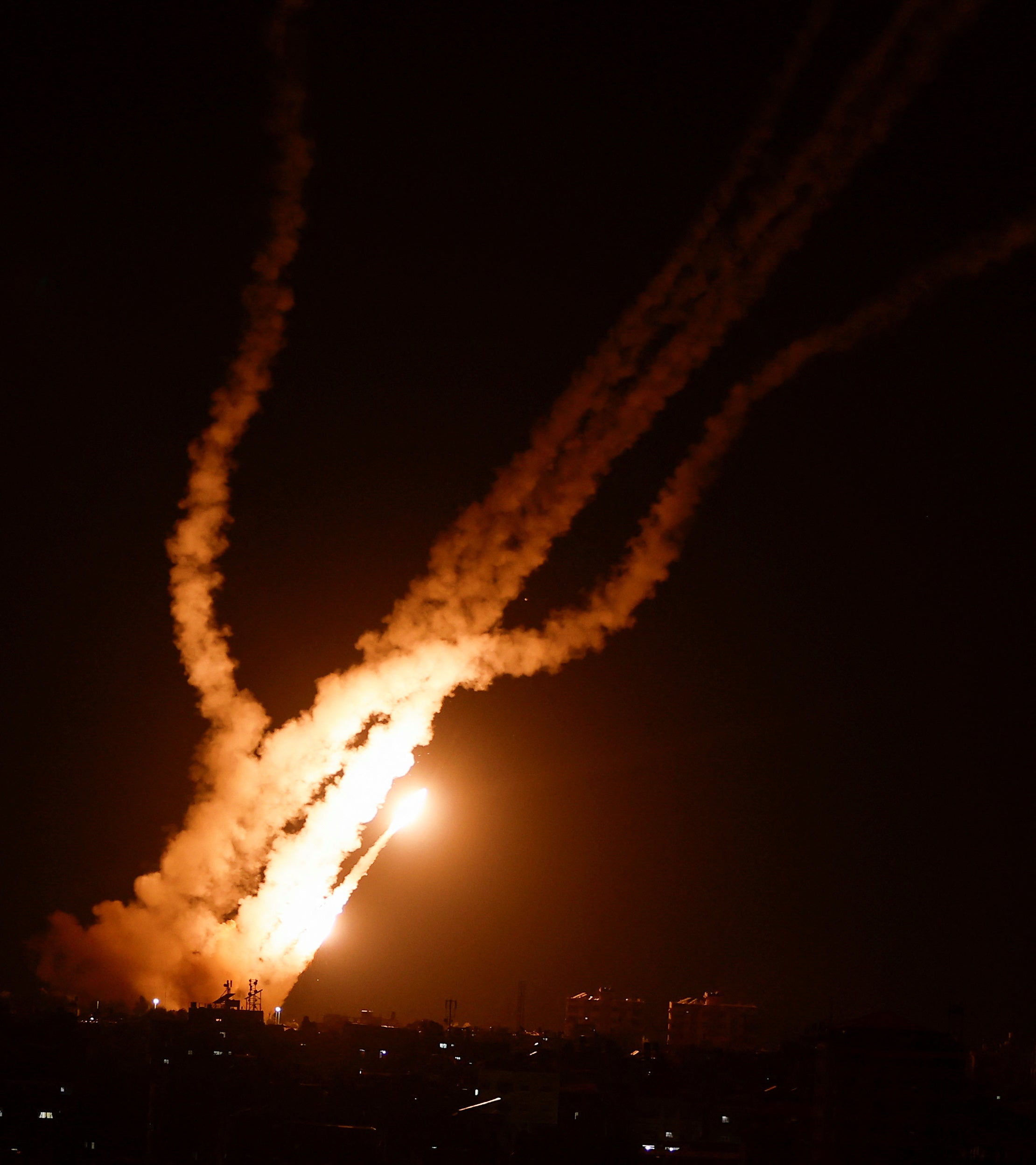
In his retaliation, Israel claimed to have hit Hamas military headquarters, compounds and other targets.
Health authorities in Gaza reported that at least 232 Palestinians had been killed and more than 1,700 injured. A nurse and ambulance driver were among those killed in strikes on two Gaza hospitals, according to Medecins Sans Frontieres.
Palestinian civilians in Gaza told The Independent the Israeli bombardment was constant and there was no electricity after Israel cut its power supply.
In a day of brutal bloodshed, Hamas said it had fought in as many as 25 locations close to the Gaza border, while Israel said its navy forces had killed dozens of militants allegedly trying to infiltrate the country by sea.
Asked whether a ground invasion of the besieged Gaza Strip could be part of Israel’s retaliation, Israeli Defence Forces spokesperson Lieutenant Colonel Richard Hecht said: “We are planning for all options.”
The redeployment of Israeli soldiers to Gaza was also “on the cards”, Israeli army officials told The Independent – the first time since the 2005 withdrawal from the strip.
Benjamin Netanyahu declared that Israel was “at war”, before calling an emergency cabinet meeting and saying that the nation would “exact an immense price from the enemy”.
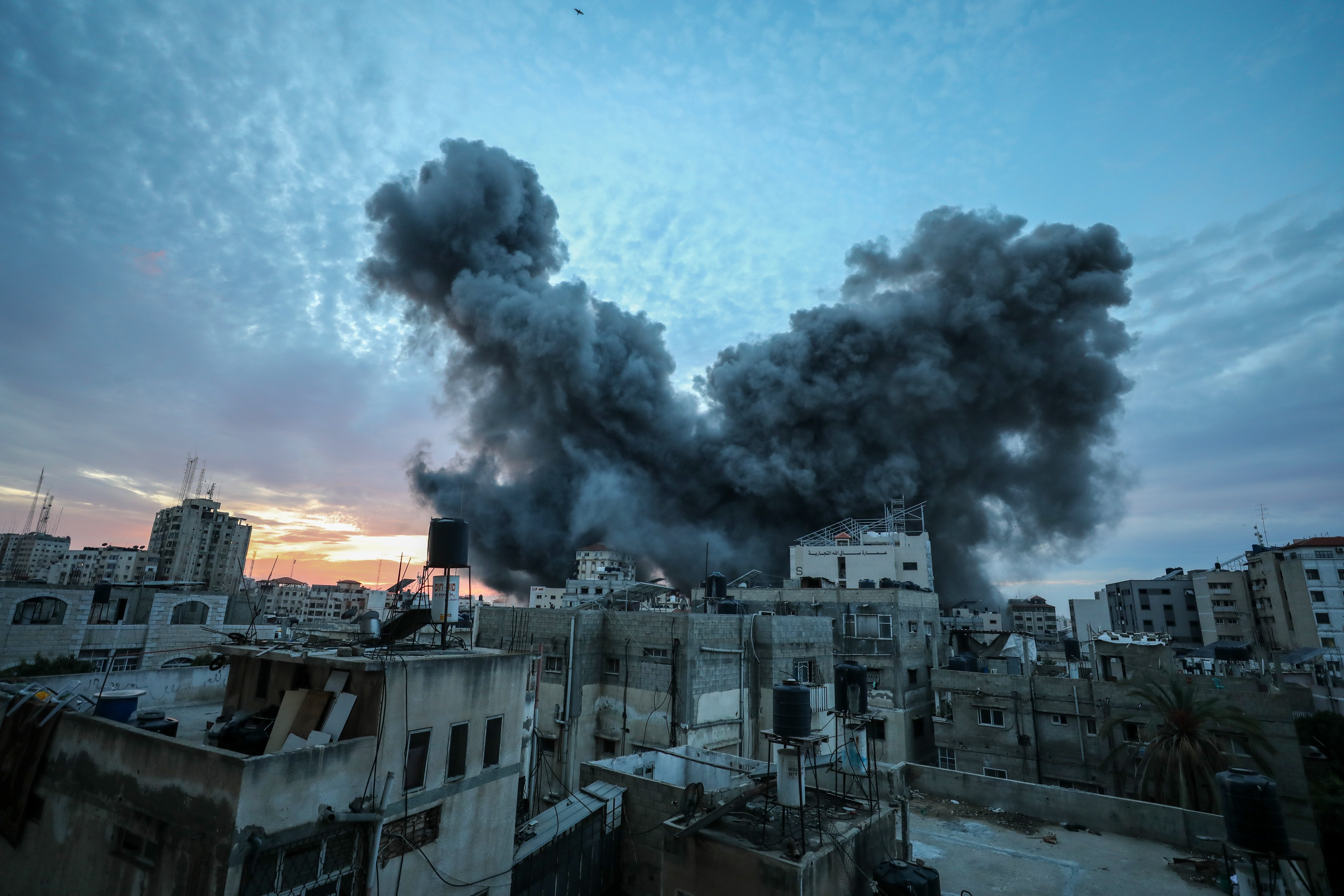
Mr Netanyahu said Israel’s first objective was to clear out “the hostile forces that infiltrated our territory and restore the security and quiet to the communities that have been attacked”.
He also vowed to reinforce its other borders “so that nobody should mistakenly join this war”.
“The enemy will pay an unprecedented price,” he said, adding that Israel would “return fire of a magnitude that the enemy has not known.”
Hamas leader Ismail Haniyeh said the assault that had begun in Gaza would spread to the West Bank and Jerusalem. “This was the morning of defeat and humiliation upon our enemy, its soldiers and its settlers,” he said in a speech. “What happened reveals the greatness of our preparation. What happened today reveals the weakness of the enemy.”
Questions have been raised over how Israeli intelligence – which has drones in the sky over Gaza and access to some of the most powerful surveillance software in the world – did not pick up on the planning of the coordinated attack.
Maj Dinar said: “After we have killed the terrorists, we will respond to this declaration of war by Hamas and sit down and ask difficult questions about how this happened.”
Rishi Sunak joined European Commission president Ursula von der Leyen and other Western leaders to heavily condemn the “terrorist” attacks by Hamas.
United States defence secretary Lloyd Austin went further in vowing that Washington would “ensure that Israel has what it needs to defend itself and protect civilians from indiscriminate violence”.
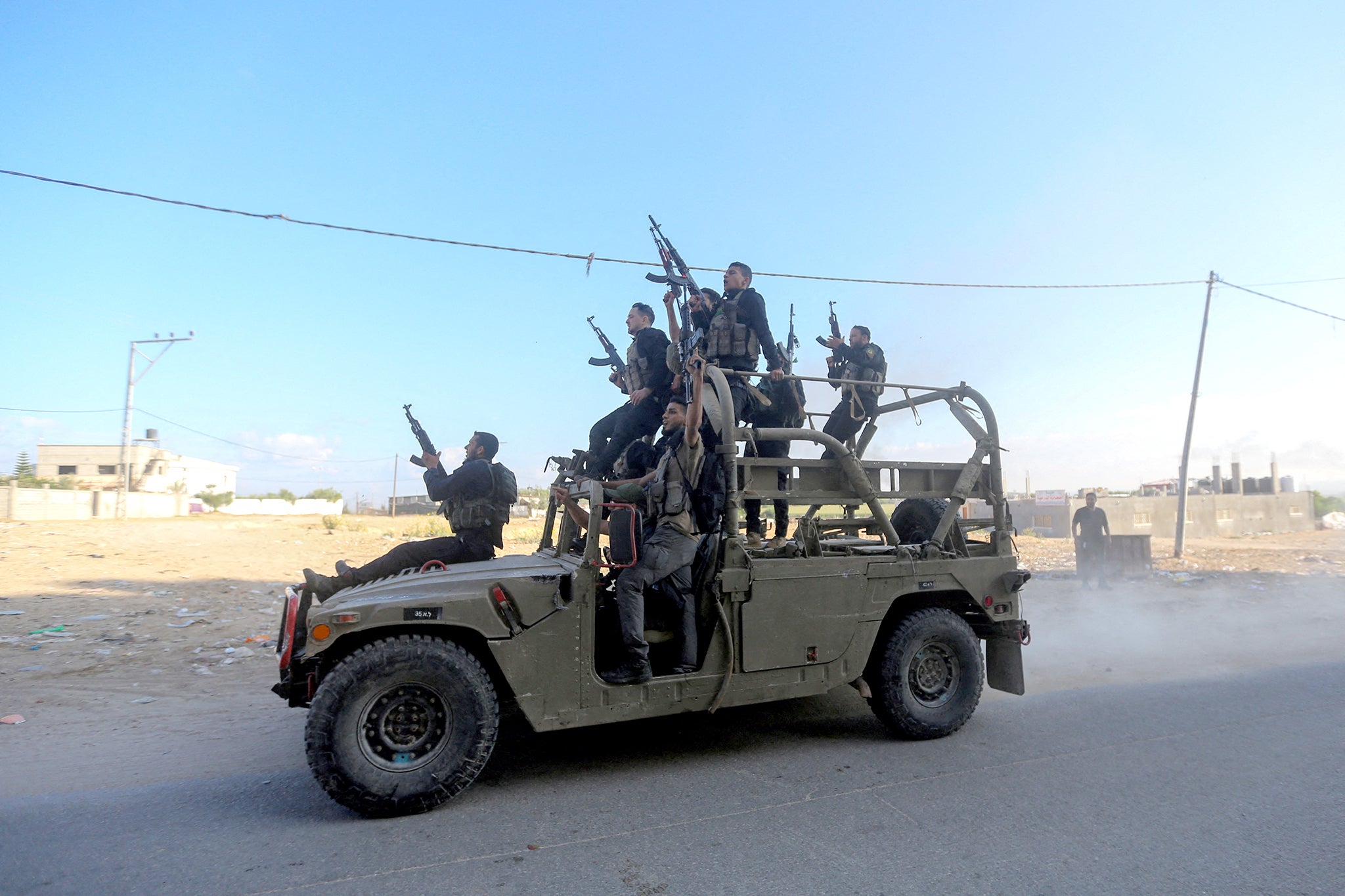
Following a phone call with Mr Netanyahu, US president Joe Biden said the US “[stands] ready to offer all appropriate means of support to the government and people of Israel”.
While Saudi Araba called for an end to the violence and Egypt called for “maximum restraint”, Iraq, Iran and Kuwait were among nations to blame decades of Israeli oppression, with Iranian state television showing parliamentarians rising from their seats to chant “Death to Israel”.
In Yemen, Houthi supporters rallied to show support for Palestine, with images emerging of Israeli and US flags being burned.
With many watching for Hezbollah’s reaction, the Lebanese militant group said it was closely following the situation in Gaza and was in “direct contact with the leadership of the Palestinian resistance”.
The United Nations peacekeeping force in southern Lebanon said it had enhanced its presence in its areas of operations near Lebanon’s southern border with Israel, including “counter rocket-launching operations”.




Join our commenting forum
Join thought-provoking conversations, follow other Independent readers and see their replies
Comments